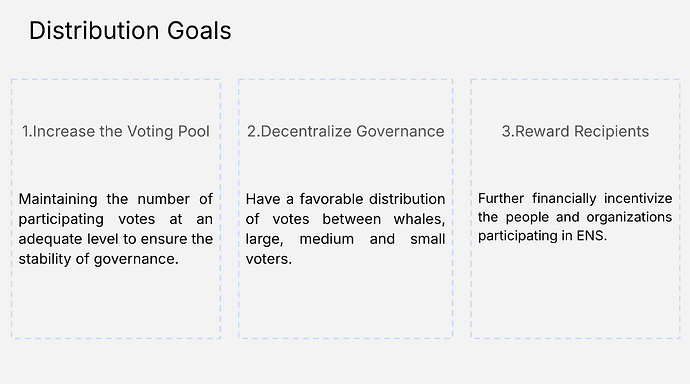1. Weekly Endowment Updates - @kpk + @Steakhouse
- /
2. ENS Distribution Monitor - @danch.quixote
- A system that tracks how effectively the DAO allocates tokens to contributors?
- Dune Dashboard.
- Full presentation with all findings.
- Efficiency means how well token distributions achieve their intended goals:
- In the last year and a half, since the first distributions conducted through Hedgy, an average of 88,000 votes were added to each vote, representing 6.5% of the total number of votes.
- 13 new voters were added with a combined voting power of 48,000
- High inactivity among EP [5.19] distribution recipients was identified.
- ENS is doing a good job of distributing tokens, generally speaking.
- All distributions in ENS could be made using a vesting format if you want to not only reward participants but also retain votes in the pool.
- Move to a format where the cliff occurs only after delegation or even after the first voting in order to also increase the involvement of recipients in ENS governance.
- The DAO needs a general statement on token distribution
- A move towards a little increase in centralization was a byproduct of people delegating to existing large delegates.
- Data metrics were verified from Dune (cross-validated using Etherscan).
- Consider changing the token allocation ratio for service providers.
- Service provider distribution has the highest quality because about 70% of tokens are used in voting.
3. [RFC] Delegation Increase Incentives System - @zeugh.eth
- Full presentation.
- Moving it soon to Temp Check after consolidating everyone’s comments.
- Goals:
- Increase the cost of governance attacks
- Increase active delegate power to those actively voting
- The proposal is to distribute ENS tokens to active delegates and their delegators.
- The idea is to give most of the tokens to delegators.
- The system is designed to incentivize holders to delegate.
- Mechanics:
- Voting power-based distribution with reward caps: 0.5% of the total pool for delegates and 5% for delegators.
- Timeheld modifier – up to 6 months of holding ENS on the wallet to scale rewards progressively.
- Minimum payout: 1 ENS; amounts less than 1 ENS enter a lottery system for up to 10 ENS.
- Goal: 30% to 50% increase in voting power.
- Active delegates must have voted in over seven of the last ten proposals
- The program is a pilot for 3 months because there are incentives that need to be balanced.
4. ICANN update - @simona_pop
- Main problematic areas:
- Language vs. mechanics: ENS’ constitutional language about not infringing name-owner rights can sound like “perpetuity,” even though the mechanics are term-limited with expiry. That messaging gap alone is triggering policy anxiety.
- Dispute resolution parity: Without a built-in, binding UDRP-style pathway, brands and rights-holders lack a familiar, enforceable mechanism to recover abusive registrations. That’s a notable divergence from ICANN norms.
- Governance priorities: "Integrate with DNS without sacrificing decentralization” is philosophically sound for web3, but for ICANN it raises the question: When these values collide, who yields?
- More to be discussed in the upcoming Weekly Public Goods call.
5. ENS Retro - @James
- Toward Accountable and Strategic Funding in ENS
- A group was formed with WG stewards and Labs to discuss retrospectives.
- The idea is to do a retro on all SPs and WGs to look at what was aimed to be achieved, what the goals were, and how the goals were addressed.
- The proposal might push back WG elections and the SPP by 3 months.
- Different levels of reporting and accountability across the WGs and SPP.
- Standardizing the levels of accountability across the working groups would be a good outcome, and see what working groups are already doing and what still needs to be done.
- There is concern about changing the election cycle so close to the election.
- SPs may have feedback but are not yet involved in the group discussions.
- The idea is to retrospectively look at how spending, activities, and outcomes have been listed.
- It might be decided that it’s important enough to reschedule elections so that the results of the retro could be taken into account before those elections happen.
- One clear outcome is improving the SPP vote process.
- Another outcome is a more built-out version of the ENS year in review.
- A third outcome is having a single place to look at all the different programs and initiatives that the ENSDA has achieved.
- The goal is not to scrutinize working group work but to use it to take things to the next level.
- The overall intention is to have some sort of mechanism or routine for evaluation and to keep the DAO accountable.
- There is a question of whether the evaluation should be done independently, in-house, or a combination of both.
- A feeling that changing rules with short notice creates disruption and instability.
- There will be a session at DevConnect where delegates and working group leads can continue the discussion.
- The discussion will also be held publicly on the forum soon.
6. Discussions & Upcoming Proposals
6.1. [Temp Check] Registration of on.eth to support interoperable addressing standards
- /
7. Open discussion
- Anonymous Feedback form for Metagov calls.
